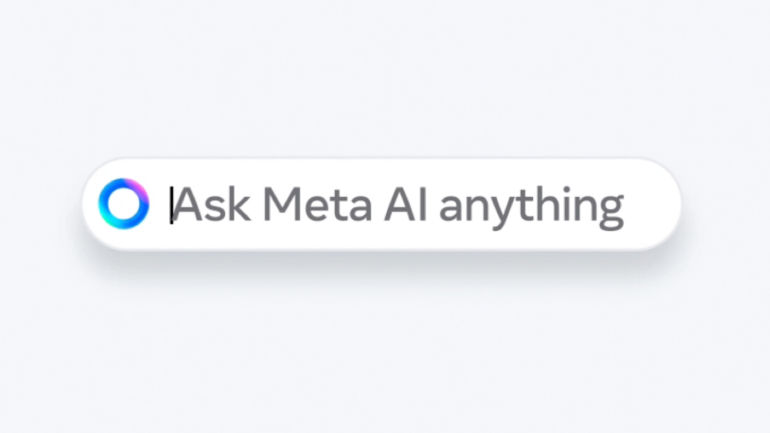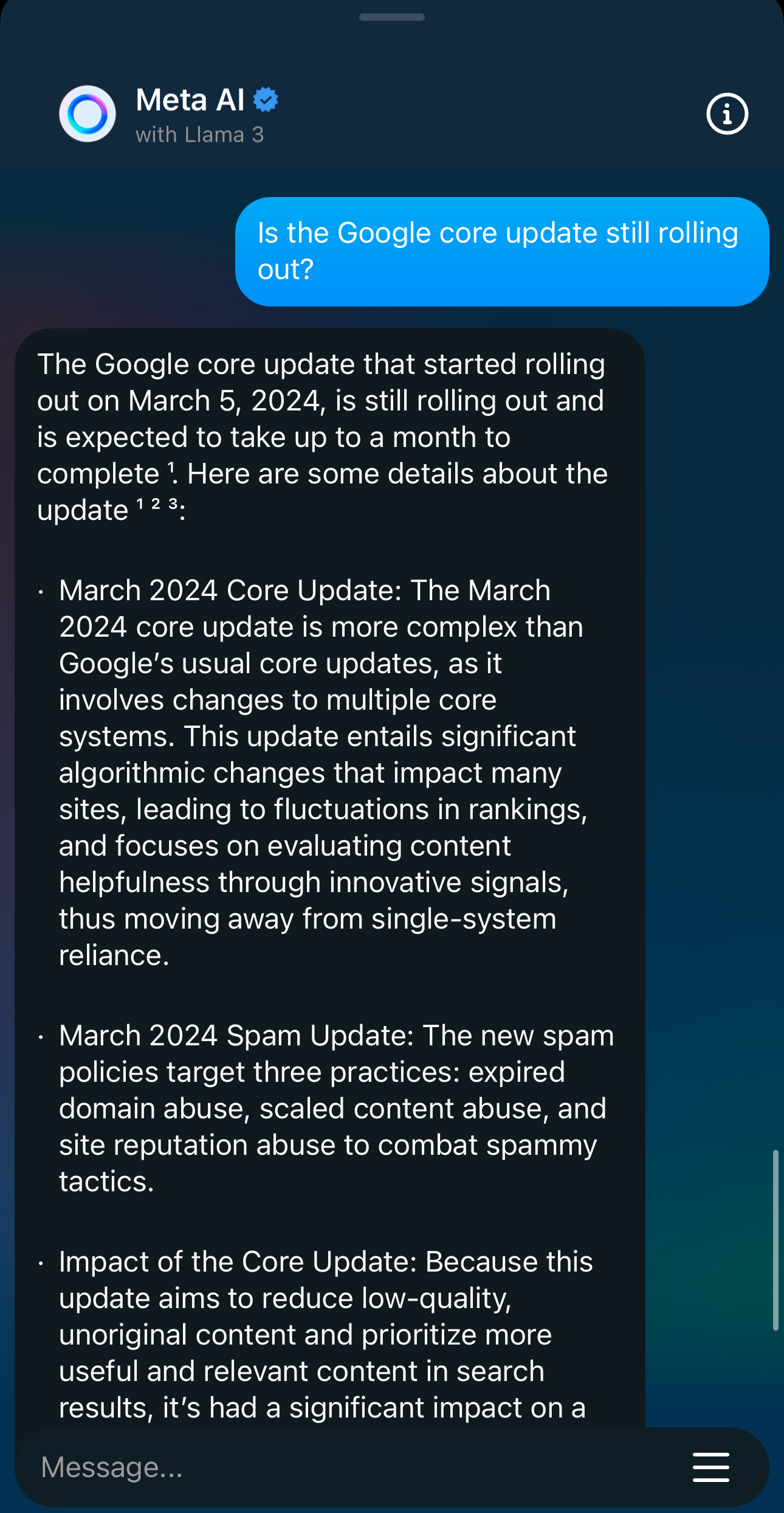
Meta's AI Assistant Enhances User Experience with Google and Bing Search Integration

Discover how Meta's AI assistant, upgraded with Llama 3, seamlessly incorporates live search outcomes from both Google and Bing, revolutionizing user interactions.
Meta’s AI assistant, now using the advanced Llama 3 model, will include live search results from both Google and Bing. This update shows progress in AI assistant features and their influence on the search field.
You can access Meta AI within Facebook, Instagram, WhatsApp, Messenger, and the newly launched Meta.ai desktop experience.
Google & Bing Search + Meta
Meta's AI assistant now combines Google and Bing results into its search capabilities. This means that instead of just using one search engine's data, the assistant can choose the best results from either Google or Bing based on the user's query.
Users now have access to a wider variety of information with this feature. I only tried Meta AI with Bing during my testing before writing this. I don't know why it chooses Bing over Google for web searches.
Here’s an example showing that it’s capable of providing up-to-date information:
Screenshot of a smartphone displaying a notification from Meta AI about the Google core update. The message details the update's gradual rollout, its focus on improving spam protections, and enhancing content quality in Google & Bing
Seamless Search Across Apps
Meta’s new search experience allows you to access relevant information without switching platforms.
For example, while planning a trip in a Messenger group chat, you can ask the assistant to find flights and determine the least crowded weekends to travel.
A screenshot of a smartphone messaging app named "bffs 4ever" integrated with AI Assistant, featuring a text message that reads, "yoooo fam! does anyone want to go to the park
Screenshot from: about.fb.com/news/, April 2024.
Meta is taking a multi-pronged approach to make its AI assistant a consistent presence across its family of apps:
Integration into the search boxes of Facebook, Instagram, WhatsApp and Messenger
Appearing directly in the Facebook main feed to respond to posts
A new meta.ai website where users can log in to have continued conversations
Real-time text-to-image generation with an “Imagine” feature in WhatsApp
Future integration with Meta’s VR headsets and smart glasses
More information about these initiatives is available in Meta’s announcement.
Implications For Search Engine Optimization
Integrating Google and Bing search results into Meta’s AI assistant has potential consequences for SEO.
AI chatbots are becoming more and more popular for helping people find information. This means that being visible in integrated search results will become even more important for publishers.
To keep up with this trend, SEO strategies may need to adapt to cater to both traditional search engines and AI assistants.
This could involve a greater focus on satisfying conversational queries that mirror how users interact with chatbots.
A Shifting Landscape
Meta's decision to incorporate search results from Google and Bing into its AI assistant shows how the search industry is constantly changing. With the merging of traditional search and conversational AI, businesses are competing to be at the forefront.
Meta’s CEO, Mark Zuckerberg, has expressed ambitious plans for the AI assistant, aiming to make it the most intelligent and widely accessible AI tool available.
With the release of the powerful Llama 3 model and incorporating search results from leading search engines, Meta is positioning itself as a top contender in the AI chatbot market.
FAQ
The Impact of Meta's AI Assistant on Search Engine Interaction
Meta's AI assistant is revolutionizing the way we engage with search engines. By merging Google and Bing search outcomes, it streamlines the process of retrieving information from various sources.
Users have the convenience of searching directly through Meta's AI assistant on Facebook, Instagram, WhatsApp, and Messenger. This integration allows for instant access to information and a chat-like interface that matches the way users prefer to search and engage with content online.
This shift towards conversational queries and the ability to stay within the same platform may lead to a change in focus for SEO strategies. Businesses may need to prioritize meeting the needs of these user interactions to optimize their online presence.
What are the features of Meta's AI Assistant?
Meta's AI Assistant offers several unique features that enhance the search experience and provide live search results from Google and Bing.
These features include:
Integration into the search functions within Facebook, Instagram, WhatsApp, and Messenger.
The ability to interact with posts directly on the Facebook feed.
Access to the meta.ai desktop experience for continued conversations.
Real-time text-to-image generation through the “Imagine” feature in WhatsApp.
Planned future integration with Meta’s virtual reality headsets and smart glasses.
Featured Image: Screenshot from about.fb.com/news/, April 2024
Editor's P/S:
Meta's integration of Google and Bing search results into its AI assistant marks a significant advancement in the search industry. This move combines the strengths of traditional search engines with the conversational capabilities of AI assistants, creating a more comprehensive and user-friendly search experience. For users, this means access to a wider range of information and the convenience of searching directly within Meta's suite of apps.
The implications for SEO are also noteworthy. As AI chatbots become more prevalent, businesses need to adapt their strategies to cater to conversational queries and ensure visibility in integrated search results. This may involve a shift towards optimizing for natural language queries and providing content that aligns with the conversational format of AI assistants. By embracing this evolving landscape, businesses can stay competitive and leverage the power of AI to connect with their target audience effectively.








